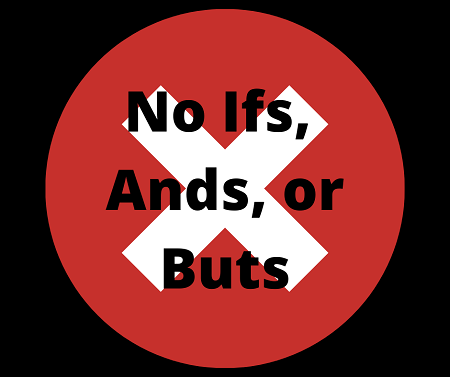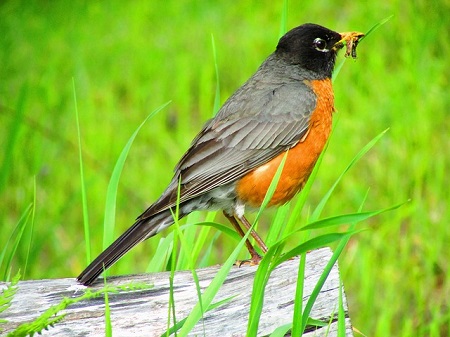No Ifs, Ands, or Buts
 “If you miss more than three classes, you fail. No ifs, ands, or buts about it.” Few students want to hear those words. Definitely not if they just missed a third class.
“If you miss more than three classes, you fail. No ifs, ands, or buts about it.” Few students want to hear those words. Definitely not if they just missed a third class.
“If you come home past curfew, you are grounded for a month. No ifs, ands, or buts.” Teenagers don’t like to hear that, especially if they just came home an hour past curfew.
No ifs, ands, or buts means no excuses.
People who say this want no:
- Arguments
- Compromises
- Explanations
- Protests
They expect others to do as instructed.
- Parents expect children to obey.
- Bosses expect workers to finish on time.
- Teachers expect students to complete assignments.
No ifs, ands, or buts also means certainty.
No doubt about it, the expected event will happen, rain or shine.
- Children promise parents they will obey.
- Workers assure bosses they will finish their work before the deadline.
- Students tell teachers they will complete their assignments before the next class.
Whether they finish early or work down to the wire, they will do it.
Everything works better when everyone meets their obligations.
A friend said she has often heard, “If ‘ifs’ and ‘buts’ were candy and nuts, we would all have a Merry Christmas.” She explained that people often say “if” or “but” instead of having faith all will work out exactly as it should.
- If anything needs to be done, do it.
- If anything needs to be said, say it.
No ifs, ands, or buts.
“Jesus replied, ‘Anyone who loves me will obey my teaching’” (John 14:23).
Do you have an expression you want explained? If so, please comment below.
Subscribe to receive my weekly posts by email and receive a free copy of “Words of Hope for Days that Hurt.”
If you enjoyed this post, please share it with your friends.
Thanks to Jeri Stone for the suggestion.
 We often hear dogs chasing rabbits behind our house. They may or may not catch any rabbits. However, we know the chase ends when the barking stops.
We often hear dogs chasing rabbits behind our house. They may or may not catch any rabbits. However, we know the chase ends when the barking stops. Rabbits are fun when they cause no damage. Chasing rabbits is fun, if we eventually
Rabbits are fun when they cause no damage. Chasing rabbits is fun, if we eventually  Please welcome my friend Andrea Giordano as today’s guest writer. I met Andrea when she was Executive Director of TESOL and ESL Programs at
Please welcome my friend Andrea Giordano as today’s guest writer. I met Andrea when she was Executive Director of TESOL and ESL Programs at  Running on fumes means you are tired or have little emotional energy.
Running on fumes means you are tired or have little emotional energy.  My friend Martha said her father described a few of her boyfriends as not worth the salt that went in their bread. He meant they were not worth much.
My friend Martha said her father described a few of her boyfriends as not worth the salt that went in their bread. He meant they were not worth much. My friend Karen collects fabric. She sews it into clothing, curtains, cushions, and quilts. You name it, Karen sews it. She does the whole nine yards. She also makes it look as
My friend Karen collects fabric. She sews it into clothing, curtains, cushions, and quilts. You name it, Karen sews it. She does the whole nine yards. She also makes it look as  Karen sews about anything, and all her work is amazing. Other people run long distances, work years on projects, or never miss their favorite activities. Most of us spend time and money on our greatest interests.
Karen sews about anything, and all her work is amazing. Other people run long distances, work years on projects, or never miss their favorite activities. Most of us spend time and money on our greatest interests. “Are you ready?”
“Are you ready?” “When you reach the end of your rope, tie a knot in it and hang on.” –Franklin D. Roosevelt.
“When you reach the end of your rope, tie a knot in it and hang on.” –Franklin D. Roosevelt. On a trip to Minneapolis years ago, I caught a plane just in the nick of time. My first plane had engine trouble, so I had to change flights. That made me late for my second flight. As a result, I had to run through the airport about 1:00 a.m. to board my plane on time.
On a trip to Minneapolis years ago, I caught a plane just in the nick of time. My first plane had engine trouble, so I had to change flights. That made me late for my second flight. As a result, I had to run through the airport about 1:00 a.m. to board my plane on time. Please welcome my friend Martin Wiles as today’s guest writer. Martin is the founder of
Please welcome my friend Martin Wiles as today’s guest writer. Martin is the founder of  “The early bird gets the worm.”
“The early bird gets the worm.” “Isn’t she the cutest thing? Why, she’s as cute as a button.”
“Isn’t she the cutest thing? Why, she’s as cute as a button.” As a child, I spent hours playing with my Granny Childress’s buttons. Since she sewed for others, she always had boxes of buttons.
As a child, I spent hours playing with my Granny Childress’s buttons. Since she sewed for others, she always had boxes of buttons.